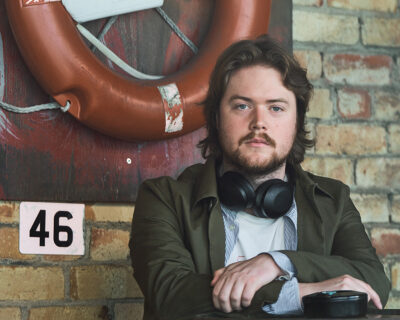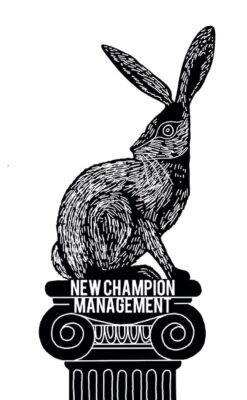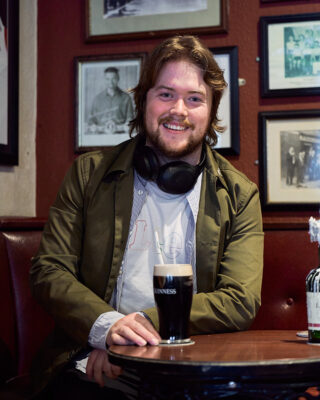When his apprenticeship started in 2019, Benjamin Magee could never known he would be running the company that welcomed him in within a year
Ben told us how exceptional circumstances, and exceptional people, gave him a music management apprenticeship like no other

I’m the director of New Champion Management, which was formerly Champion Sound Recordings, where I started as an apprentice.
I took over in December of 2019 and rebranded it as an homage to the previous director.
How’s business?
Each day is very different. Meetings with clients and partners, whether that is labels, music publishers or live booking agents.
Beyond that my week is devoted to scouting new talent and creative sessions with bands. We’ll look at marketing campaigns for their singles; what’s the aesthetic, what are the messages we’re sending.
So why music?
I’m more of an idealist than a businessman. I come from a place of fandom and a passion for Irish music particularly. My dad and mother were in the local music scene in Belfast during the conflict here.
That sort of lifestyle breeds very passionate fans and that bled into me. It wasn’t really until the movie Good Vibrations and the Good Vibrations label in Belfast that it developed into something I could make my own.
I didn’t necessarily get into music to work in management, but it’s where my skills lay.
Now I am a super fan of everyone I work with. I think the role of the manager is not just to drive forward your artist’s career, it’s also to champion the music that you think deserves to be heard in a world where it’s difficult for independent music.
That’s where the name comes from, to ‘champion’ the artists that I love, but also to advocate the industry of where I’m from. I believe in people, I believe in the power of community and the power of belief and the power of neighbourhood talent.
Getting started
My first role in the local industry was as a journalist. I wanted to give local bands their first press quote. But I was never as crazy, fanatical or obsessed with writing music as I was to listening to it and going to shows.
I read Q Magazine like the Bible. I just felt like these are my people. Whether or not they were successful musicians or selling hundreds of tickets, I just liked being around promoters, photographers, managers, tour managers and roadies.
But there isn’t really a lot of robust infrastructure in the north of Ireland or Belfast. It’s very much an individual and private enterprise as opposed to a thriving ecosystem.
So why the apprenticeship?
I was following a local music industry head, a guy called Lyndon Stephens. We were friends on Facebook and Instagram.
The guy was the closest thing we had to an industry leader in Belfast, private enterprise, a rebel, a soul brother, a techno head, he just had been around everything and just knew the answer to every question.
He posted a reminder to a job application closing the next day. The link brought me to the BPI and DiVA creative industries apprenticeship.
And I remember seeing that and thinking: “This is my way in. What do you mean? I get paid to be in music? This is incredible, and I’ll get to learn from this local legend.”
He’d read a lot of my stuff. I’d covered quite a few of his artists as he worked with this incredible roster. At my interview we just really hit it off. We argued for an hour about everything that you could argue about.
I walked out of the office thinking, I ruined that. I just argued with the guy I want to learn from for an hour. But he rang me three days later and offered me the job, which was crazy.

How was it starting out?
My first few weeks were a baptism by fire. I’d never worked in live music before. I’d never worked in recorded music before, and all of a sudden I started having these conversations with big companies like Believe and Live Nation.
It both gave me anxiety and was everything I ever wanted it to be. I felt like I belonged, like I’m supposed to be here. I’m doing work that matters.
I’m not just making some rich guy loads of money. I bounced out of bed at 7:00 in the morning to get to work.
What next?
It’s not a happy story. When I began working for him, I found out he had been given a cancer diagnosis years prior and was initially only given six months to live.
He had beaten that diagnosis and now it was three years later. We had all convinced ourselves that he would beat it. Every time he went in for a check the cancer got smaller, even though we knew it wasn’t going to last.
And just before I went on tour to North America with an act, he called me and said: “Yeah, it’s spread. I’m not going to get better this time.”
It got to a crossroads where Lyndon was either going to sell the company or have us take over. I was beyond scared – no idea what to do. I didn’t want to run a business – still don’t want to run the business.
I was saying to him: “I will keep it in Belfast, I promise you. I’ll keep it in Belfast.
“I will look after the artists that are here. I’ll look after the community here, I’ll look out, I’ll keep it in our home.”
He sold me the company for far, far less than it was worth to make sure that I wouldn’t be stuck in debt.
That was 11 December 2019 and on 10 January 2020, he passed away.
It was crazy because we had planned a farewell gig that night for the label and he passed away the morning of the gig. The entire show was this huge wake for him, with all the bands, his biggest clients coming together to play.
The next month, Covid hit. I remember walking in at one point and there were 110 emails of cancelled shows and I just closed my laptop and went home. I couldn’t be dealing with it.
Where did that leave you?
We survived largely down to the skills I learned in the apprenticeship and the support that the BPI have given me over the years, plus the skills that Lyndon taught me in the few short months that we were working together.
Before I took over my hair was a lot shorter. I didn’t have a beard. When I was in charge, I didn’t have time to go to the barbers. It was more about keeping myself above the water and inventing a place for myself in the industry.
I wanted to pay testament to the legacy of what Lyndon had done for local industry and musicians from a place that we both care about.
How are things now?

It’s just been me for a little while. I’m a bit of a lone wolf. I’ve had short term apprentices over the years where they’ve come in and helped me out with live shows where we’re paying them for their time and making sure they are not just taking away our wages but also skills.
It was how I was left to work with Lyndon, how I was trained. I’m very much a kinesthetic learner, I learn by doing. I like to think I’m a teacher, a leader as opposed to a manager.
I think the scene’s in good hands if it’s full of kids who think they know better than everybody else – you need punks.
I want to be get to a place where three of my clients can take home a steady income and be in a position to take on a student in music or business studies from the local university.
Any advice?
Yeah, have fun. It did need to be taken very seriously, particularly when I took over in December. But I went into it too eager to learn and not eager enough to make mistakes, something that any successful business person will tell you is not to fear failure.
Go in with your eyes open. This is not a business for the faint of heart. But it’s also not a business for boring people either. Be excited, be interested, ask questions, and don’t be afraid to make mistakes.
Oh and get an accountant. You’ll stop looking at your bank account and wondering where all your money went.
I know I don’t love anything as much as I love this. I would have ended up either moving to work in the music industry, which would have made me miserable, or I would have stayed and I would have got a corporate job in banking and be bored stiff.
Without my mentor or the apprenticeship I wouldn’t have the confidence to be in charge, to take ownership of what I wanted in the industry, the legacy I want to leave and the artists that I want to work with.
Like you live on a razor at all times, your margins are razor thin. But what the apprenticeship taught me, what Lyndon taught me, was if you’re going to live on those margins, you might as well be in charge.
The long term goal is showing kids that just because you don’t come from a rich background, the best neighbourhood or the nicest postcode, it doesn’t mean you can’t work in the arts.
There is a pathway for you where you don’t have to leave your friends or family behind. You don’t have to fight to find your new favourite sandwich shop in London.
 Department for Culture, Media and Sport
Department for Culture, Media and Sport
